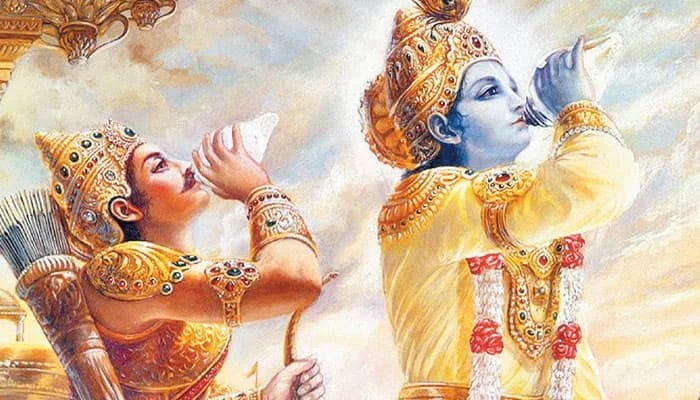New Delhi: In a rare display of admiration for India’s ancient spiritual heritage, Chinese scholars have hailed the Bhagavad Gita as “the nectar of knowledge” and “a concise history of Indian civilization.” Speaking at a symposium organized by the Indian Embassy in Beijing, they described the sacred text as a timeless guide that offers solutions to modern dilemmas and embodies the essence of duty, action, and detachment.
The event, titled “Sangamam – The Confluence of Indian Philosophical Traditions,” brought together leading Chinese academics and Indologists, who paid rich tributes to the Gita’s universal teachings. Many participants emphasized that the scripture transcends time and geography, bridging the material and spiritual dimensions of human life.
Professor Zhang Baosheng: The Voice of Devotion
The highlight of the symposium was the address by Professor Zhang Baosheng, an 88-year-old scholar who translated the Bhagavad Gita into Chinese. Calling it a “spiritual epic,” he said translating the text was a necessity because it embodies India’s enduring spiritual vision — the principles of duty (dharma), action (karma), and detachment (vairagya) that continue to define Indian life.
Recalling his travels across India between 1984 and 1986 — from Kanyakumari in the south to Gorakhpur in the north — Prof. Zhang said he could feel Lord Krishna’s presence everywhere. “The Gita,” he observed, “has a living influence on Indian psychology, morality, and social life.”
He further described it as “a miniature history of Indian civilization” and noted that its reach extends far beyond India, with translations in nearly every major language of the world.
“A Dialogue Beyond Time”
Professor Wang Zhi-Cheng, Director of the Center for Oriental Philosophy Research at Zhejiang University, described the Bhagavad Gita as a 5,000-year-old dialogue that continues to answer humanity’s deepest concerns. “The Gita,” he said, “is not a relic of the past but a mirror for the present — it provides light when we lose our way.”
Calling it the “nectar of wisdom,” Prof. Wang explained that Lord Krishna’s 700 verses offer not just doctrine but “spiritual keys” that unlock eternal truths. He outlined the three paths of knowledge — Karma Yoga (the path of action), Sankhya Yoga (the path of wisdom), and Bhakti Yoga (the path of devotion) — as enduring methods for solving life’s moral and existential challenges.

“India’s Philosophy Is a Light for the World”
Professor Yu Longyu, Director of the Indian Studies Centre at Shenzhen University, highlighted that studies by various Chinese scholars reveal India’s immense cultural and philosophical legacy. “A great civilization like India,” he said, “possesses a profound intellectual and spiritual heritage that deserves deep study and dissemination.”
Urging his fellow Chinese scholars to explore Indian thought more closely, Prof. Yu added, “In today’s world, leading Chinese intellectuals often embrace threefold learning — Chinese, Western, and Indian. I urge my colleagues to study Indian culture with dedication and contribute to China’s renewal, Sino-Indian harmony, and global peace.”
Strengthening Cultural Bridges
Welcoming the scholars, India’s Ambassador to China, Pradeep Kumar Rawat, said the symposium was a continuation of the embassy’s earlier Ramayana Conference held last year. He emphasized that Indian philosophy has, for millennia, sought answers to the most fundamental questions: What is truth? What is the nature of reality? How do knowledge and action lead to liberation?
“From the logic of Nyaya to the discipline of Yoga, from the introspection of Vedanta to the compassion of Buddhism,” Ambassador Rawat said, “Indian philosophical traditions represent diverse paths converging toward a single quest — the pursuit of knowledge, harmony, and truth.”
The symposium concluded with a renewed call for cross-cultural academic collaboration, as Chinese scholars expressed their intent to expand studies on Indian scriptures, emphasizing that the Bhagavad Gita’s universal message of balance, righteousness, and self-realization remains as relevant today as it was on the battlefield of Kurukshetra.










